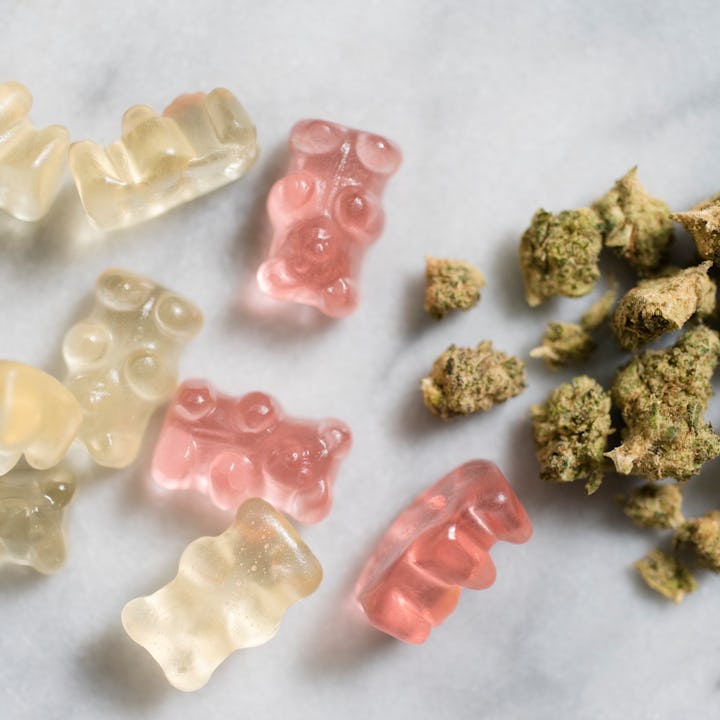Thousands Of Toddlers Are Eating Their Parents’ Marijuana Edibles And It’s Not Good
More than 7,000 confirmed cases of kids younger than 6 eating marijuana edibles were reported, according to new study.

Marijuana — whether medicinal or recreational — is now legal for adult use in 39 states. And though the drug is still banned federally, a growing number of states are permitting the legal use of marijuana. That number will most likely only grow.
There has also been an uptick in reported sickness and hospitalization in children who have stumbled upon their parents’ or siblings’ stashes of legal edibles. This is no coincidence.
Due to the fact that most edible marijuana comes in the form of a gummy, cookie, or candy — kids are finding the stashes of their family members and eating it as if it was just another fun food to snack on.
According to a new study, the number of young kids, especially toddlers, who accidentally ate marijuana-laced treats rose sharply over five years, and it’s something that all parents and guardians should be very aware of.
Between 2017 and 2021, the nation’s poison control centers reported more than 7,000 confirmed cases of kids younger than 6 eating marijuana edibles. Nearly 1/4 of the children who ate an edible wound up hospitalized, some seriously ill, according to a new analysis in the journal Pediatrics.
Dr. Marit Tweet, a medical toxicologist with the Southern Illinois School of Medicine, who led the study, also noted that these confirmed cases are just the ones that were reported to poison control centers. Many others likely didn’t report the incident.
Researchers analyzed reports from parents and caregivers to the National Poison Data System, which includes the nation’s 55 regional poison control centers. More than 50% of the children who were sickened were toddlers — ages 2 and 3 — the study showed. More than 90% got the edibles at home.
“They’re the ones starting to explore and to get up and move around,” Tweet said of the at-risk age group.
With the growing number of states legalizing pot, Tweet is calling for more diligence from marijuana manufactures when it comes to the safety of children in homes where marijuana-laced treats are present. Often times, edibles are packaged to look like kids’ candies and snacks, Tweet hopes that laws will be put into place to make these less appealing and accessible to children.
“When it’s in a candy form or cookies, people don’t think of it in the same way as household chemicals or other things a child could get into,” she said. “But people should really be thinking of it as a medication.”
So, what happened to these kids after consuming edibles? Of more than 7,000 reports to poison control, researchers tracked down the outcomes of around 5,000 cases. They found that nearly 600 kids were admitted to critical care units often diagnosed with depressed breathing or even coma.
Nearly 15% of the children were admitted to non-critical care units and 1/3 were seen in emergency rooms. Drowsiness, breathing problems, fast heart rate and vomiting were the most common symptoms.
An increasing amount of states legalizing marijuana is not the only reason for the uptick in children accidentally consuming edibles.
The coronavirus pandemic is also a contributing factor, said a co-author of the study, Dr. Antonia Nemanich, an assistant professor of emergency medicine and toxicology at Rush University Medical Center in Chicago.
Both school closures and increased time spent at home could have played a role in the rise, they said.
Dr. Sam Wang, an emergency medicine physician and pediatrician at Children’s Hospital Colorado, told NBC News that the study reflects what he is seeing in his hospital. Wang said the majority of the cases at the Colorado hospital have been “pretty mild,” with most children experiencing sleepiness or loss of balance.
However, in rare instances, Wang did see children who needed to be put on ventilators to help with breathing or children who had fallen into comas.
Parents can be vigilant in keeping their children safe from accidental edible consumption with just a few easy tips and housekeeping tasks. If you keep marijuana edibles in your home, find a secure place to keep them out of the reach of your little ones. Store them in a high cabinet or shelf. A locked box designed to keep medications safe could also work.
Consider buying edibles that aren’t brightly-colored or that come in attractive shapes, like gummy bears.
In addition, keep an eye out for signs that your child accidentally eaten a marijuana edible including drowsiness, balance issues and sudden abnormal behavior.
Marijuana is getting more and more normalized in our culture — and there are lots of upsides to that. But even as it’s legalized and less stigmatized, it’s just as important as ever to keep our kids safe from our medications.
Learn more about marijuana intoxication and what parents can do to keep their kids safe here.
This article was originally published on